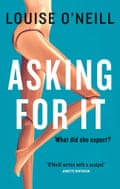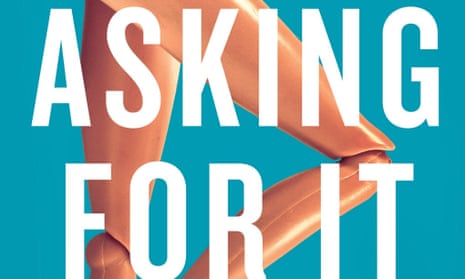At a wedding recently, a friend whom I hadn’t seen in a while introduced me to his new girlfriend.

“My name is Emma,” she said, and I couldn’t help but wince. She, obviously enough, looked bewildered at my reaction and what followed was a rather mortifying attempt on my behalf to explain that the central character in my new novel, Asking for It, was called Emma and that her story wasn’t a particularly happy one. She backed away slowly, no doubt marvelling at my seeming inability to distinguish between fiction and reality.
It was an odd experience, and one which I have never had before. After I finished editing my first novel, Only Ever Yours, I felt able to let the story go. I rarely, if ever, think about what happened to the characters in that book. And yet I frequently think about Emma, and when I do, I usually well up. It’s embarrassing as I don’t like to think of myself as the type of writer who is so moved by their own work that they find themselves in tears. I always thought of that kind of behaviour as almost unbearably precious and self-indulgent. But and but and but… there’s just something about Emma.
Anyone who has read the book has commented on how “unlikeable” she is, how that in any other novel Emma would be the quintessential mean girl. She’s beautiful and intelligent. Boys love her and girls want to be her; she is, in some ways, almost a caricature of the most popular girl in school. Yet she is jealous and narcissistic. She is vulnerable and unsure of herself and belittles her friends to make herself feel better. Her father calls her his Princess, his baby girl, and has her firmly on a pedestal while her mother competes with her in ways so subtle they are almost impossible to pinpoint. She loves her brother because he treats her like a person rather than an blank page upon which to project his own ideas of what she should be like, and simultaneously pushes away her oldest childhood friend, Conor, punishing him for having the audacity to see the real her beneath the facade that she likes to present to the world. Emma is a mass of contradictions and in so many ways, feels like the most honest character I have ever created.
As a result of that, she behaves in ways that neither I nor the reader will approve of or even understand. That was a deliberate decision on my behalf – I wanted to take the idea of the “perfect victim” and tear it to shreds. Too often society will only feel sorry for the victims of rape if they conform to a certain ideal – we don’t tend to have too much sympathy for a woman is sexually assaulted if she was as sex worker or if her clothes were too tight and too short. Sometimes, in the most secret part of ourselves that we hide from the world, we secretly think that it was her fault is she was too drunk, too high, too promiscuous, too much. I wanted the reader to be complicit with the victim blaming in Asking for It. I wanted the reader to be caught up in the energy of that community, to feel infected by its seething paranoia and small town righteousness, to start asking themselves if it was Emma’s fault? Was she asking for it? The way which Emma reacts to being so violently attacked is confusing as well – why doesn’t she want to bring them to justice? Why does she want to pretend that the incident never happened? That’s not how “proper” victims react, is it?
While researching Asking for It, I talked to many women who had been raped and none of them reacted in the same way. Some expressed their regret that they hadn’t reported it to the police, others wished that they had never told anyone about it. Some were angry, some were paralysed with fear and grief, unable to maintain the semblance of a normal life. Some felt repulsed by the idea of having sex again, others spoke of voracious sexual appetites as if determined to prove that the rape would not affect them. The only similarity between all of the women that I spoke with was a sense of shame, a sense that they should have and could have done something to prevent this from happening to them. And it is that sense of shame that I tried to bring to life with Emma, that darkness that crawls beneath your skin and embeds itself in your bones, calling to you day after day. Your fault. Your fault. Your fault.
Your. Fault.

That is what our society has done to women. It has created a situation where we are held up to such a more rigorous standard of moral behaviour than men are, that it is we that are somehow to blame when our bodies have been violated without our consent. This is why women blame themselves. This is why someone like Chrissie Hynde, decades after being brutally assaulted, believes that she deserves to take full responsibility for what happened to her, saying “this was all my doing… If you play with fire you get burnt.” Women think that we should have known better, we should have protected ourselves, we should have screamed and shouted and flailed. We should have been good girls. We should have been better.
Maybe that’s why I think of Emma constantly. Because what happened to her is real, it occurs every day, to millions of women (and men) all over the world, and we do nothing to stop it. We do nothing to root out the cause, burn the sickness at its very core. We search and we search and we search for yet another reason to blame the victim. “Well, I wouldn’t have walked home by myself… well why didn’t she get a taxi?…she shouldn’t have gone home with him… Men only want one thing… she shouldn’t have, she shouldn’t have, she shouldn’t have…”
I am sorry to all the Emmas of the world. I am so sorry.
- Louise O’Neill’s latest book Asking for It is available at the Guardian bookshop.
